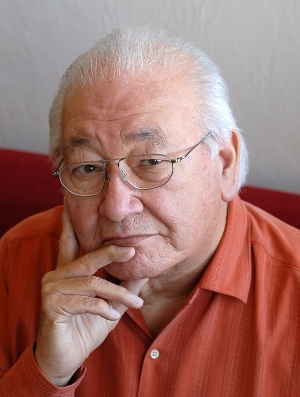“Let all our wishes come true! Let all living creatures be free of suffering, of danger, of diseases and sadness! Let peace and happiness govern on Earth!”
More than 2,000 Buddhists chanted the mantra, kneeling on mats before the Golden Abode of Buddha temple in Elista, the capital of the republic of Kalmykia, one of three traditional Buddhist regions in Russia. They repeated words of prayer after the Kalmyk Buddhist leader, Telo Tulku Rinpoche. Finally, the square grew quiet as the group went into deep meditation.
As night fell, thousands of candles were lit. Buddhist monks visiting from Tibet, Thailand, and the United States, as well as Russian Buddhist regions of Buriatya and Tuva, blessed those who gathered from all over Kalmykia and the neighboring southern regions of Russia. They sent candles flying skyward in hot air balloons, illuminating the dark night sky.
The ceremony, an offering of light to Buddha, was introduced to Russian Buddhists for the first time as a symbolic event celebrating the beginning of the international forum, “Buddhism: Philosophy of Non-Violence and Compassion,” held in Elista last month.
Despite objections from China, a group of 30 Tibetan monks from the Gyudmed Monastery, assigned by the Dalai Lama, arrived to bless the republic’s main temple and 17 sculptures of great scholars of Nalanda University inside.
The 17 statues of Nalanda scholars - who compiled outstanding commentaries to Buddha Shakyamuni’s precious teachings - have a particular importance for His Holiness the Dalai Lama who considers Tibetan Buddhists to be spiritual heirs of Nalanda, a major monastic learning centre of India that was destroyed by Muslims, but only after its scholars had passed their skills and knowledge to Tibetans. From Tibet, scholastic traditions of Nalanda were then spread to Mongolia and Buddhist republics of Russia.
At the ceremony, the candle kites formed a path of light in the pitch-black sky. “That is our white road,” somebody whispered in the crowd.
“Have a white road” is the most sincere greeting people traditionally give each other in Kalmykia.











